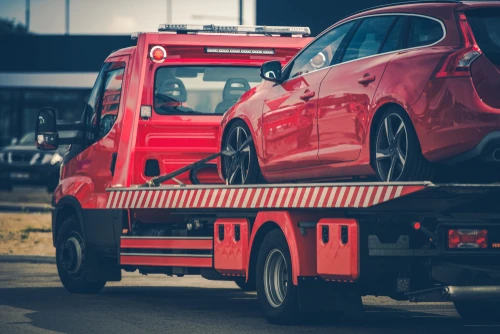Dallas Tow Truck Lawyer

When most people think of a tow truck, they imagine a helpful vehicle that arrives on the scene of an accident to take their car to a body shop. However, in Dallas and other North Texas communities, tow trucks are sometimes responsible for causing accidents themselves.
If you or someone you know was in a tow truck accident, it’s time to seek legal assistance. Tow truck accidents can be distressing, painful experiences. They may damage or total your vehicle and may result in injuries for you and your passengers. Some tow truck accidents may be fatal. The injury and death rate among tow truck workers is high due to tow truck accidents.
Compensation for damages can help you replace your car, cover medical bills, and provide financial assistance if you are unable to return to work after being in a tow truck accident. To receive this compensation, our Dallas lawyers will fight for you.
Call (214) 496-5227 to speak to an attorney today. A consultation call with one of our lawyers is free, and there’s no obligation to you. If you do accept our services, there’s no upfront payment. You’ll only pay us if we help you win your case.
Why Do Tow Truck Accidents Happen in Dallas?
Tow truck accidents happen in Dallas for several reasons. It is helpful to learn more about tow trucks and how they operate to understand tow truck accident risks.
Tow trucks vary in size and towing capacity. Depending on size, a tow truck may be able to tow other vehicles ranging in weight from 7,000 to 17,000 pounds. Tow trucks also use different types of towing equipment:
- Booms: A boom is one of the most common types of towing equipment — this is a large “arm” that utilizes a winch to transport other vehicles, and are frequently used to pull crashed cars and trucks out of hard-to-reach spaces, like ditches.
- Wheel-Lifts: Wheel lifts, also known as “spectacle lifts” or “under lifts,” are a type of tow that resembles a large metal yoke. The lift is fitted beneath the towed vehicle’s front wheels, lifting the tires into the air so it can be transported easily behind the tow truck.
- Integrated Lifts: These lifts combine a boom and a wheel lift, enabling the tow truck driver to operate the lift equipment from within the cab. Operators use integrated lifts to move illegally parked vehicles quickly.
- Flatbeds: Similar to the flatbed of a cargo truck, tow truck flatbeds can tilt and slide down to ground level. Vehicles can then be driven on the bed or pulled up with a winch.
One of the worst types of tow truck accidents occurs when the towing equipment hasn’t been adequately secured or fails due to poor maintenance. If a vehicle detaches from or falls off a tow truck, it can be disastrous for drivers traveling behind the tow truck.
The loose vehicle can create accidents by blocking traffic, requiring other drivers to come to an unexpected stop or swerve — or it may leak gasoline or oil and create hazardous road conditions.
In other situations, the towed vehicle may remain partially attached but swing into another lane. If there is heavy traffic and a driver in the next lane is too close to the tow truck, they may be hit by this vehicle.
Tow trucks also have reduced visibility when they’re towing. The other vehicle may partially or fully obscure the driver’s back window. Additionally, the size of a tow truck can reduce its blindspots. The tow truck driver may cause an accident because they don’t see you.
Additionally, accidents may occur when the towed vehicle obscures the truck’s brake lights and turn signals. Many tow truck operators attach a specialized lighting rig to the motorized vehicle they are hauling. If this rig malfunctions, other drivers won’t be able to see the truck’s braking or turning.
Finally, tow truck accidents can also be caused by the standard risk factors associated with many Dallas car accidents:
- When the driver is impaired, or under the influence of drugs or alcohol
- When the driver is distracted by their phone or radio
- When the driver is speeding
- When the driver fails to measure stopping distance accurately
- When the tow truck experiences engine problems due to poor maintenance
Injuries Associated with Tow Truck Accidents
Being in a tow truck accident may damage or total your car, pickup truck, or SUV. However severe, the damage to your vehicle is still minor compared to the potential injuries that a tow truck may cause.
In the worst accidents, these injuries may be fatal. But even a nonfatal accident may impact you and your passengers with lifelong, chronic injury. You may need surgeries, physical therapy, home care, and other long-term rehabilitation. A tow truck accident injury may prevent you from returning to work and can also result in psychological pain, such as anxiety, depression, and PTSD.
Physical injuries that often occur following a tow truck accident include:
- Cuts, bruises, and burns
- Broken bones and torn ligaments
- Injury to head, neck, and shoulders
- Traumatic brain injury
- Back and spine injury
What Should You Do After a Tow Truck Accident?
Our lawyers are here to help you if you have been involved in a tow truck accident in Dallas, Fort Worth, or other North Texas communities. We’ll get to the bottom of your accident, determine liability, and calculate the compensation you may be owed to ease your pain and suffering. Our Dallas tow truck lawyers will help win your case. If we don’t, you won’t pay for our services.
To learn more about how our legal services can help you, call our Dallas law office today at (214) 496-5227. Your consultation call is entirely free, and there’s no obligation. Let us assist you with recovery from your tow truck accident.
